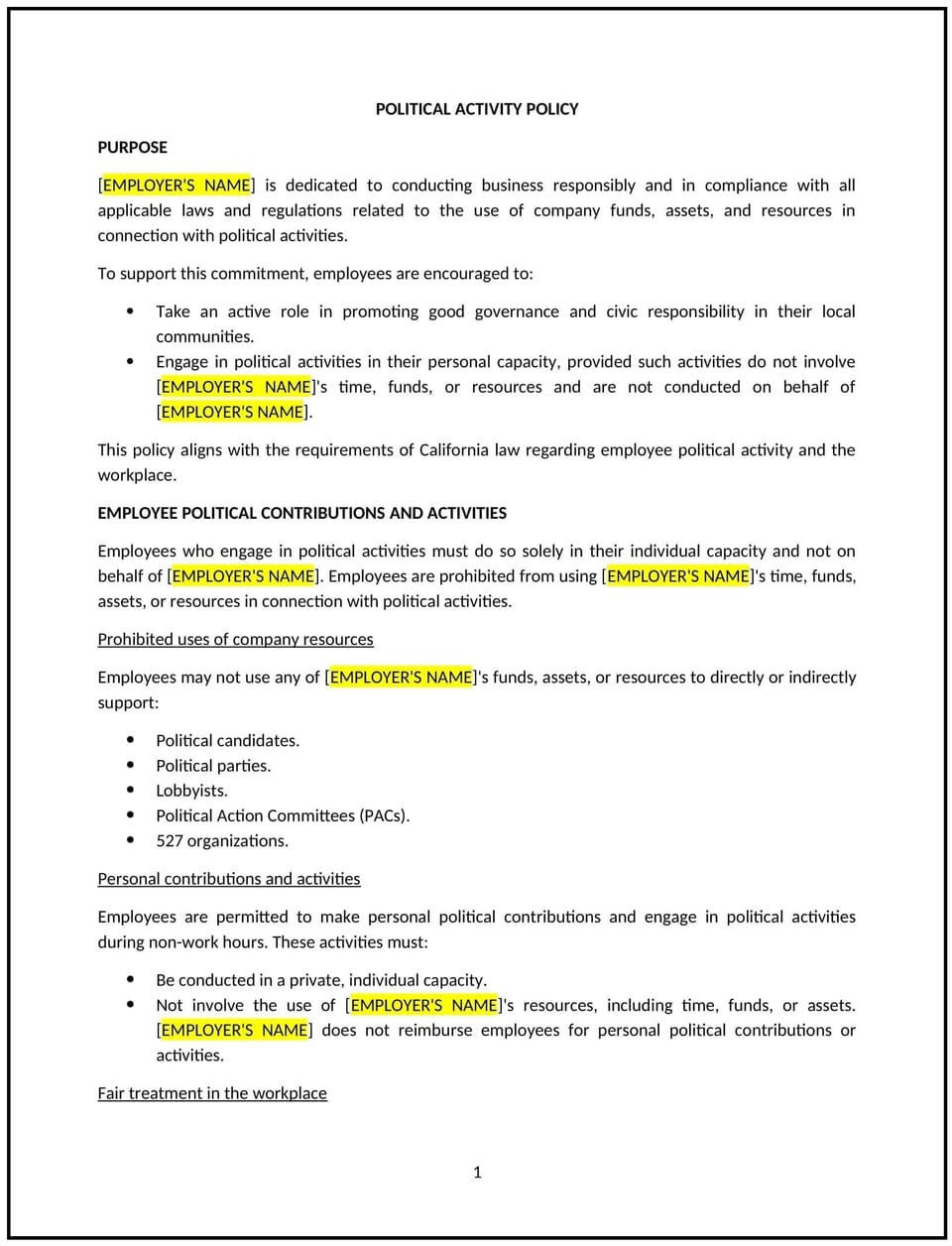Political activity policy (California): Free template

Political activity policy (California)
In California, a political activity policy provides businesses with guidelines for managing employee participation in political activities, both within and outside the workplace. This policy ensures compliance with California labor laws, including protections under the California Labor Code Section 1101 and 1102, which safeguard employees from discrimination or retaliation for political activities.
This policy outlines acceptable behavior, workplace expectations, and the business’s stance on political discussions and activities during work hours. By implementing this policy, California businesses can promote inclusivity and maintain a professional work environment.
How to use this political activity policy (California)
- Define scope: Specify how the policy applies to political activities during work hours, on business premises, or when representing the business.
- Communicate employee rights: Clarify that employees are protected under California law to engage in political activities outside of work without fear of retaliation.
- Set workplace expectations: Prohibit political activities, such as campaigning or soliciting, during work hours or on business property unless expressly authorized.
- Promote respect: Encourage employees to engage in political discussions respectfully and avoid creating a hostile work environment.
- Document complaints: Establish procedures for reporting and addressing concerns related to political activity in the workplace.
Benefits of using this political activity policy (California)
This policy offers several advantages for California businesses:
- Supports compliance: Reflects California labor laws that protect employees’ rights to engage in political activities without discrimination.
- Promotes professionalism: Ensures political activities do not disrupt workplace operations or relationships.
- Reduces conflicts: Provides clear guidelines to minimize misunderstandings or disputes related to political expressions.
- Enhances inclusivity: Encourages a respectful workplace culture that values diverse perspectives.
- Protects business reputation: Clarifies that employees’ political views do not reflect the business’s official stance unless explicitly stated.
Tips for using this political activity policy (California)
- Reflect California-specific laws: Ensure the policy aligns with Labor Code Sections 1101 and 1102, protecting employees’ political rights.
- Train managers: Educate supervisors on handling political activity-related concerns respectfully and lawfully.
- Limit workplace disruptions: Clearly define prohibited political activities during work hours to maintain productivity.
- Encourage respect: Foster an inclusive culture where employees feel safe expressing their political views outside of work.
- Review regularly: Update the policy to reflect changes in California labor laws or workplace dynamics.
Q: How does this policy benefit the business?
A: This policy supports compliance with California labor laws, promotes workplace professionalism, and reduces conflicts related to political activities.
Q: Can employees engage in political activities during work hours?
A: Employees are generally prohibited from engaging in political activities, such as campaigning or distributing materials, during work hours or on business property unless authorized.
Q: How does this policy support compliance with California laws?
A: The policy reflects California Labor Code protections, ensuring employees can engage in lawful political activities outside of work without retaliation.
Q: What steps should employees take if they feel discriminated against for their political views?
A: Employees should report their concerns to HR or management following the procedures outlined in the policy to ensure a prompt and fair resolution.
Q: How can the business handle workplace conflicts related to political discussions?
A: The business can encourage respectful dialogue, remind employees of workplace expectations, and mediate disputes to maintain a professional environment.
This article contains general legal information and does not contain legal advice. Cobrief is not a law firm or a substitute for an attorney or law firm. The law is complex and changes often. For legal advice, please ask a lawyer.


